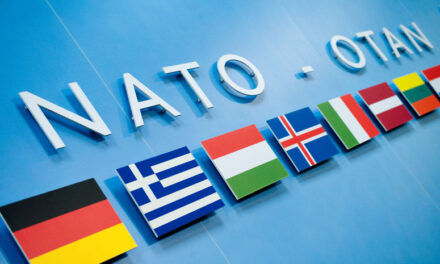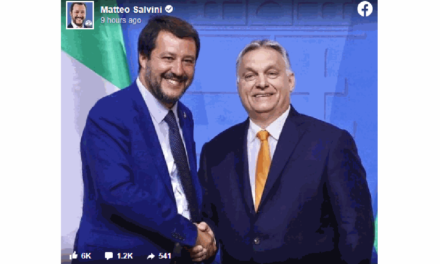The Visegrád Four (V4) - which oppose the mandatory resettlement quota and Brussels' pro-immigration policy - have agreed to provide assistance to Lithuania in curbing migration from Belarus, said the Minister of Foreign Affairs and Trade at the press conference of the foreign ministers of the V4 countries on Monday, in front of the Komárom town hall. The Slovak and Polish foreign ministers and the Czech deputy foreign minister also emphasized the importance of the EU debate on the future of Europe.
Péter Szijjártó added: in the next few days, they will work out the details and coordinate the assistance to Lithuania, be it human resources or technical equipment, fencing.
He put it this way: there will be joint, coordinated assistance in Visegrád so that "our Lithuanian friends can also protect the external border of the European Union".
He added that the most important goal of the Hungarian presidency of the Visegrád group is to help the economy in the entire Visegrád region to restart quickly.
Restarting the economy is not possible with a tax increase, so Hungary continues to oppose the global minimum tax, the minister said, pointing out that budgetary and financial discipline has been achieved in all four countries.
"We expect those who could not be disciplined not to want to impose on us the higher tax burdens resulting from their own financial policy mistakes," he added.
Appreciating the importance of the V4 countries, Péter Szijjártó said that 15 percent of Hungary's foreign trade was conducted with its three Visegrad partners last year and in the first four months of this year, amounting to 30 billion euros last year.
In response to a journalist's question about the smartphone wiretapping case, the minister stated that the Information Office he oversees does not use the program in question, and did not cooperate in any way.
Péter Szijjártó announced; if the national security committee is convened on the matter, the head of the Information Office will say the same thing.
At the press conference, Ivan Korcok described the ministerial exchange held in Komárom on the future of the European Union as extremely useful and important. He noted: Slovakia "chose a slightly different path than Hungary" and will first find out the opinion of the population. The "all-Slovak debate" on this topic should begin at the end of August, he said.
In Slovakia and in the Visegrád group, it is necessary to talk about "in the EU, we do not see any danger that the EU would move in the direction of some kind of super-state", Ivan Korcok noted, possibly having imperial ambitions. On the other hand, according to him, it should also be obvious that the EU is not beyond criticism either.
The Slovak minister emphasized: "in the Visegrád group, we must say more about the fact that the EU has no alternative for us". We need to talk more about "what and how we want to do in the EU," he added.
Ivan Korcok and Czech Deputy Foreign Minister Jan Kohout said in unison that their countries support Lithuania. Both also spoke with appreciation about the planned program of the Hungarian Visegrad presidency.
Czech Deputy Foreign Minister Jan Kohout He welcomed the fact that the program attaches great importance to the strengthening of neighborhood relations, which the coronavirus epidemic has put to a serious test.
Jan Kohout emphasized that the Czech Republic considers the conference and dialogue on the future of Europe that has just started to be very important. "Everyone's opinion should be heard. And it's also important to find out what the citizens don't like, what we need to improve," the Czech deputy minister pointed out.
In his opinion, this debate also clearly shows why the V4 group is so important. It not only creates a basis for the exchange of opinions, "but also a forum through which we can better assert our interests," declared the Czech Deputy Foreign Minister.
Zbigniew Rau also highlighted the EU debate on the future of Europe as an important topic of the meeting. Poland expects the European population to be much more involved in the debate, he said. So far, politicians have had experience with the operation of EU institutions, but "the majority of the decisions made by these bodies affect ordinary citizens", he noted.
He said that at the meeting, they discussed increasing the role of national parliaments in relation to the future form of the EU's operation. They discussed which issues should be entrusted to the common EU policy and which to the member states.
Regarding the migration situation in Lithuania, the Polish minister mentioned "the unimaginable pressure of the Lukashenko regime". He said that Vilnius has already requested help from the V4 member states separately, that the group of countries wants to coordinate this assistance, and that it wants to be a strong advocate for Lithuania when the Baltic country faces this unprecedented challenge.
He also drew attention to the fact that Lithuania's border is also an EU border, so a European reaction is needed, primarily from the nearest neighbors.
Regarding the recovery of the regional economy after the coronavirus epidemic, Zbigniew Rau said: the prospects are very good, the economic development of the V4 will affect the economy of the entire EU.
The Polish foreign minister called the delay in the accession process of the Western Balkan countries "unfounded", stressing that this is the common position of the Visegrad countries.
MTI
Cover image: (MTI/EPA/Swen Pförtner)












